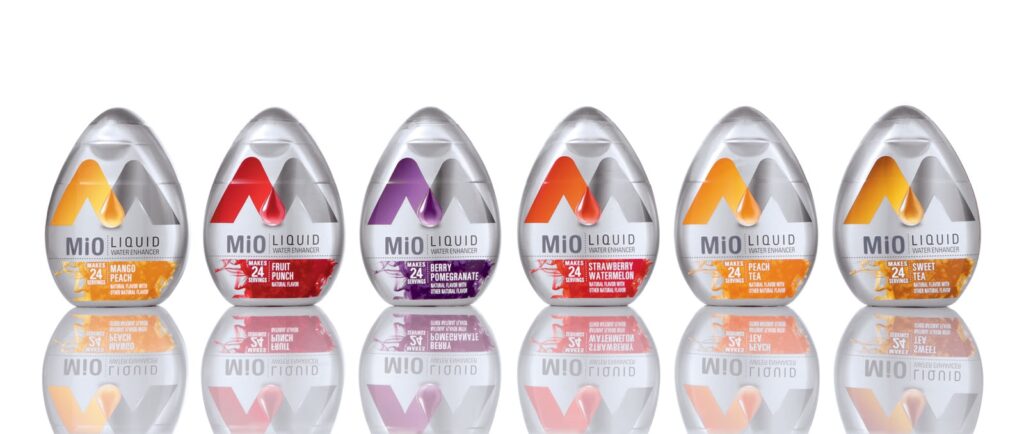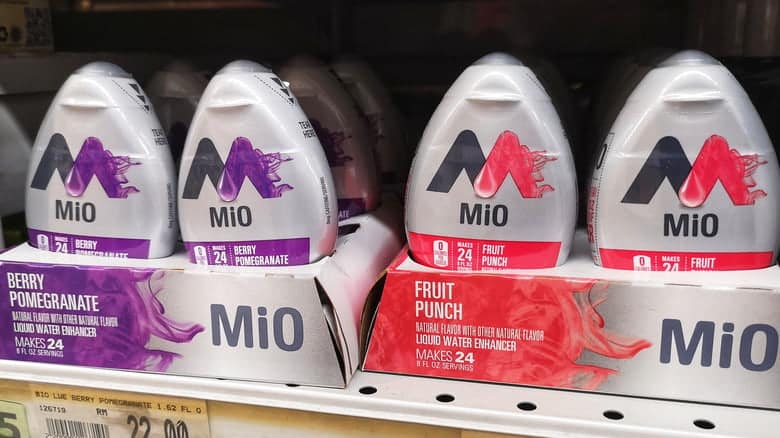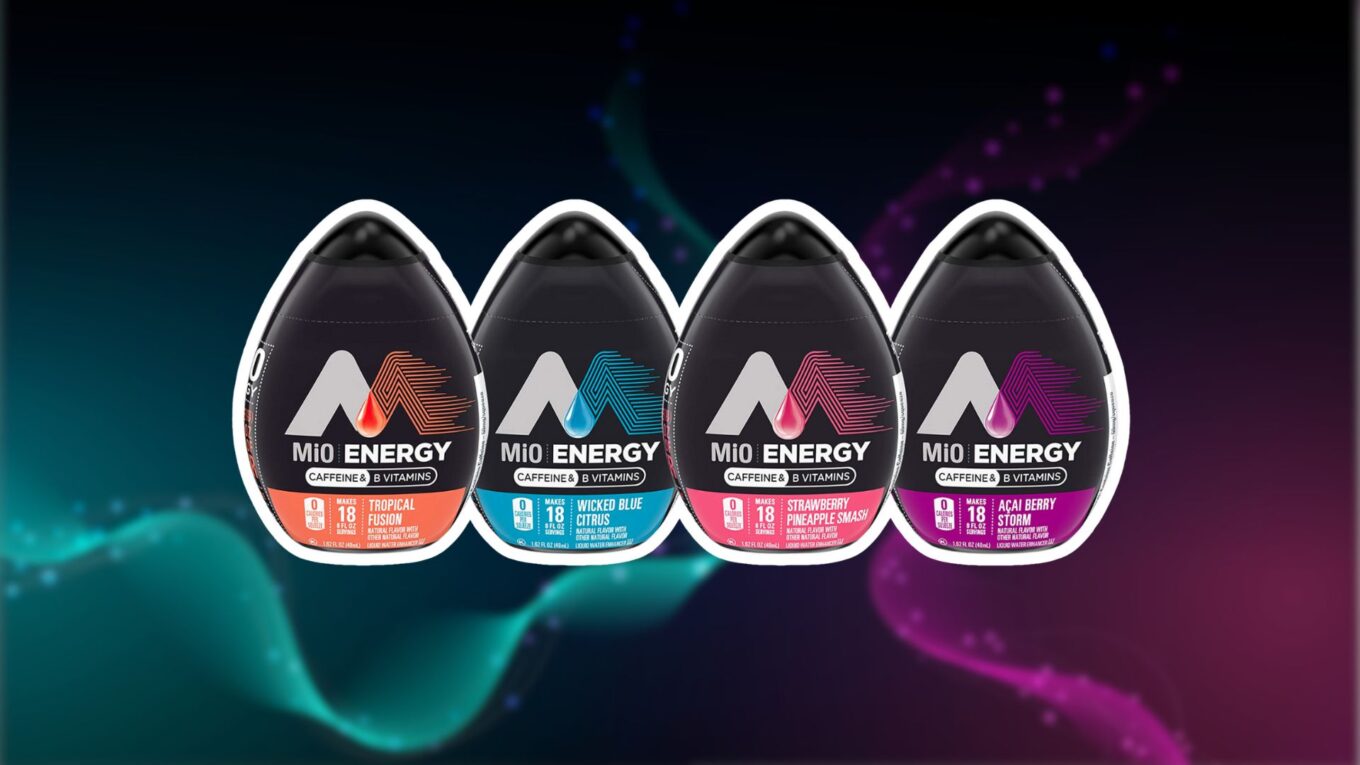Water enhancers like MiO have become a popular way to add flavor to plain water. Many people find them helpful for increasing their daily fluid intake.
However, concerns about MiO’s ingredients and their potential health effects have surfaced, leading some to ask: is MiO bad for you?
Some worry that artificial sweeteners and additives in MiO might negatively impact health over time. This article will examine MiO’s ingredients and their possible effects on your well-being.
We’ll explore the pros and cons of using MiO regularly, looking at potential benefits and risks.
By the end, you’ll better understand whether MiO suits you and how it may influence your health.
We’ll also suggest alternatives if you’re looking for other ways to make your water more appealing, helping you decide is MiO bad for you or a helpful addition to your diet.
What is MiO?
MiO is a liquid water enhancer designed to add flavor to plain water. It comes in small, portable bottles that allow users to customize their drinks on the go. The Kraft Heinz Company produces MiO in various product lines.
- MiO Original: Offers basic flavoring without added benefits
- MiO Vitamins: Contains B vitamins for potential health perks
- MiO Electrolytes: Aimed at replenishing electrolytes, similar to sports drinks
- MiO Energy: Includes caffeine for an energy boost
These options cater to different needs and preferences, from simple flavor enhancement to added nutritional elements.
MiO’s popularity stems from its convenience and ability to make water more appealing, potentially increasing daily fluid intake for many users.
What Does MiO Comprise Of?
MiO contains several key ingredients.
| Category | Details |
|---|---|
| Artificial Sweeteners | Sucralose and acesulfame potassium provide sweetness without calories. |
| Natural Sweeteners | Some MiO Vitamins flavors use stevia leaf extract. |
| Caffeine | Found in MiO Energy for stimulation. |
| Vitamins | B3, B6, and B12 in certain product lines. |
| Preservatives | To extend shelf life. |
| Artificial Dyes | For color. |
These ingredients work together to create MiO’s flavor profiles and potential benefits. However, some of these components have raised questions about their long-term health effects.
The artificial sweeteners in MiO make it a zero-calorie option, appealing to those watching their calorie intake.
The vitamins in some varieties may offer nutritional benefits, while the electrolytes in MiO Sport aim to support hydration during physical activity.
The caffeine in MiO Energy provides a stimulant effect for those seeking an energy boost.
Potential Benefits of MiO

While some question if MiO is bad for you, it does offer certain advantages. Let’s explore the potential benefits of using MiO, from increased hydration to vitamin supplementation, and how these might positively impact your health.
1. Increased Hydration
Staying well-hydrated is vital for your body’s functions. It helps regulate body temperature, aids digestion, and supports healthy skin.
However, many people find plain water boring, leading to inadequate fluid intake.
MiO can make water more enjoyable by adding flavor without calories. This may encourage people to drink more water throughout the day.
By making hydration more appealing, MiO could help users meet their daily fluid needs more easily.
2. Calorie-Free Sweetener
MiO uses artificial sweeteners to provide flavor without adding calories. This can be helpful for people managing their weight or those with diabetes who need to control their sugar intake.
Unlike sugary sodas or fruit juices that can add hundreds of calories to your daily intake, MiO-enhanced water remains calorie-free.
This allows users to enjoy sweet-tasting beverages without the extra calories or blood sugar spikes associated with sugar-sweetened drinks.
3. Vitamin Supplementation
Some MiO products contain B vitamins, specifically B3, B6, and B12. These vitamins play important roles in your body.
- Vitamin B3 (Niacin) helps convert food into energy and supports skin health.
- Vitamin B6 aids in protein metabolism and red blood cell formation.
- Vitamin B12 is crucial for nerve function and the formation of red blood cells.
While getting vitamins from a balanced diet is best, MiO can boost your vitamin intake. This might be particularly useful for people who struggle to meet their vitamin needs through food alone.
Potential Health Risks of MiO Ingredients

Despite its popularity, MiO’s ingredients have raised some health concerns. This section examines the potential risks of MiO’s artificial sweeteners, dyes, and preservatives, helping you decide whether to use them.
1. Artificial Sweeteners
MiO contains artificial sweeteners like sucralose and acesulfame potassium. While these provide sweetness without calories, their long-term health effects are debated:
- Gut Microbiome: Some studies suggest these sweeteners may alter gut bacteria, potentially affecting digestive health and metabolism.
- Insulin Response: Research indicates artificial sweeteners might influence insulin sensitivity, though results are mixed.
- Weight Management: Despite being calorie-free, some research hints at a possible link between artificial sweeteners and weight gain, though the mechanism isn’t fully understood.
It’s important to note that views on artificial sweetener safety vary among health experts, and more research is needed for definitive conclusions.
2. Artificial Dyes
MiO uses artificial dyes like Yellow 5, Red 40, and Blue 1 for coloring. These additives have raised some health concerns:
- Hyperactivity: Some studies suggest a potential link between artificial dyes and increased hyperactivity in children, though the evidence is inconclusive.
- Allergic Reactions: A few people may experience allergic reactions to certain food dyes.
- Other Health Concerns: While generally considered safe by regulatory bodies, some researchers call for more long-term studies on artificial dyes’ health effects.
3. Preservatives
MiO contains preservatives like propylene glycol and potassium sorbate to extend shelf life. While these are approved for use in food:
- Propylene Glycol: In large amounts, it may cause digestive upset. However, the amounts in food products are generally considered safe.
- Potassium Sorbate: Some people may be sensitive to this preservative and may experience mild allergic reactions.
The long-term effects of regular consumption of these preservatives are not fully known, and more research is needed to understand any potential risks associated with frequent intake.
Alternatives to MiO

If you want to enhance your water without MiO, you have options. We’ll discuss natural alternatives and other commercial products that can add flavor to your water, potentially with fewer artificial ingredients.
1. Natural Water Enhancers
If you’re looking to add flavor to your water without artificial additives, consider these natural options:
Fruit and Herb Infusions:
- Add slices of lemon, lime, orange, or cucumber to your water
- Infuse water with fresh herbs like mint, basil, or rosemary
- Combine fruits and herbs for unique flavors (e.g., strawberry and basil)
Benefits of Natural Infusions:
- No artificial sweeteners or preservatives
- Added vitamins and antioxidants from fresh ingredients
- Customizable flavors based on personal preference
These natural options allow you to enjoy flavored water while avoiding the potential risks of artificial ingredients.
2. Other Commercial Products
Several brands offer water enhancers with fewer artificial ingredients than MiO:
- True Lemon: Uses crystallized lemon for flavor
- Stur: Sweetened with stevia leaf extract
- Nuun: Offers electrolytes with natural flavors
Pros of These Alternatives:
- Often contain fewer artificial ingredients
- May use natural sweeteners like stevia
- Some provide added vitamins or electrolytes
Cons to Consider:
- They may be more expensive than MiO
- They might not offer as wide a variety of flavors
- Some still contain preservatives for shelf stability
When choosing an alternative, read labels carefully to ensure they align with your health goals and preferences. Remember, plain water remains the healthiest option for hydration.
Summing It Up
Determining whether is MiO bad for you depends on various factors. While it may help increase water intake and provide a calorie-free alternative to sugary drinks, the artificial ingredients raise some concerns.
MiO’s potential benefits include improved hydration and vitamin supplementation, but the long-term effects of its artificial sweeteners, dyes, and preservatives are still debated.
For those worried about these additives, natural alternatives like fruit-infused water or other commercial products with fewer artificial ingredients may be worth exploring.
Ultimately, the decision to use MiO should be based on individual health goals and preferences. If you choose to use MiO, moderation is key.
As with any dietary choice, it’s wise to consult a healthcare professional, especially if you have specific health concerns or conditions.
Frequently Asked Questions
Is MiO in Water Healthy?
MiO can help increase water intake, which is beneficial. However, its artificial ingredients may pose health concerns.
While it’s calorie-free, the long-term effects of its sweeteners and additives are still debated among health experts.
Is There Anything Unhealthy in MiO?
MiO contains artificial sweeteners, dyes, and preservatives that some consider potentially unhealthy.
These ingredients have been linked to possible gut microbiome disruption, insulin sensitivity changes, and other health concerns, though more research is needed for definitive conclusions.
Is MiO Hard on Kidneys?
There is no strong evidence suggesting that MiO is particularly hard on kidneys. However, its artificial sweeteners and additives may affect some individuals differently.
People with existing kidney issues should consult their doctor regularly before consuming MiO or similar products.
What are the Side Effects of Drinking MiO?
Possible side effects of drinking MiO may include digestive discomfort, headaches, or allergic reactions in sensitive individuals.
Excessive consumption might lead to increased cravings for sweet foods. However, most people can drink MiO moderately without experiencing noticeable side effects.




